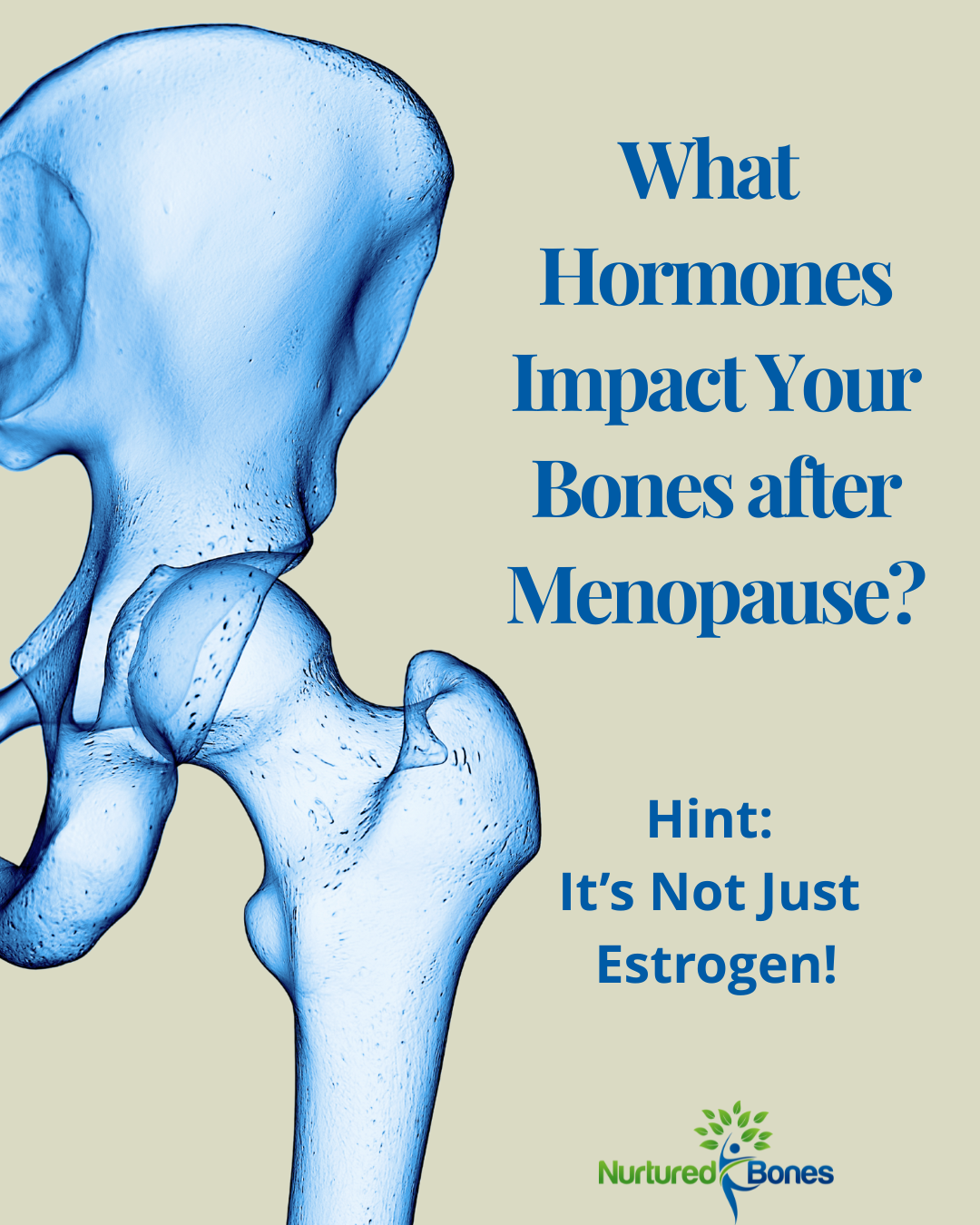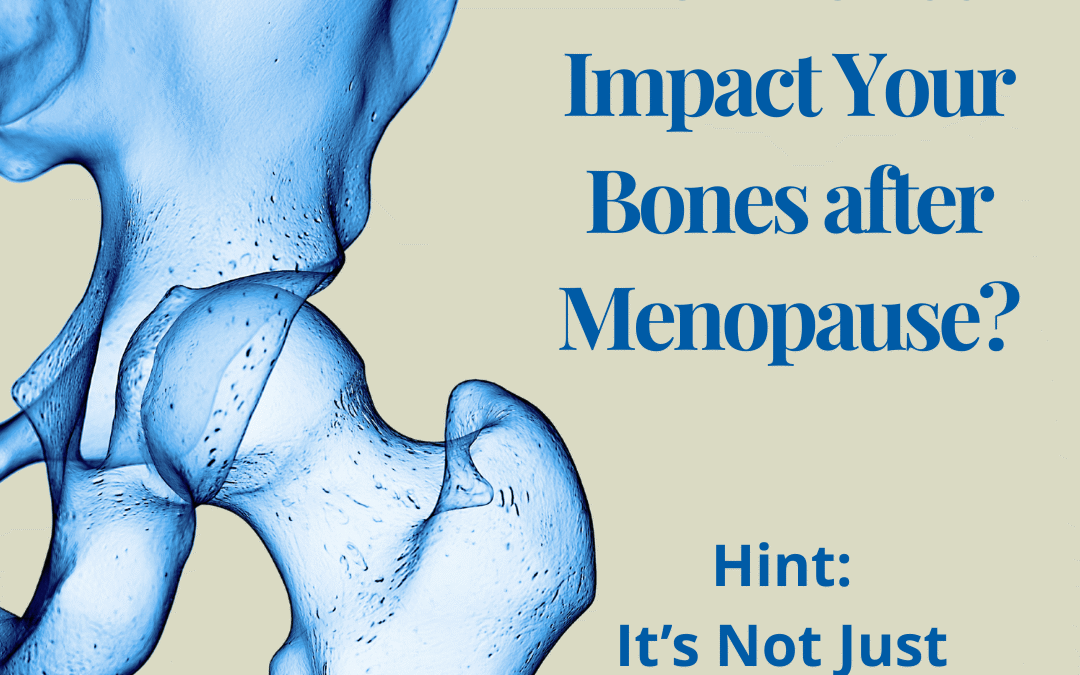Estrogen protects your bones for most of your life—but when levels drop after menopause, bone breakdown speeds up. And while you may not be able to dramatically boost estrogen, you can influence two other key hormones that impact bone health: cortisol and insulin.

Hormones and Bone Health: More Than Just Estrogen
Hormones play a major role in bone health—especially as we age. Most of us know that the decline of estrogen during menopause can trigger bone loss. Estrogen helps maintain a delicate balance between osteoclasts (cells that break down bone) and osteoblasts (cells that build new bone). When estrogen levels fall, that balance tips, and bone breakdown begins to outpace bone formation.
But estrogen isn’t the only hormone affecting your skeleton.
Two other hormones—cortisol and insulin—also influence bone density. Unlike estrogen, which is difficult to replenish naturally in significant amounts, cortisol and insulin are directly influenced by your daily habits. And when they’re out of balance, they can quietly sabotage your bones.
Estrogen: Your Lifelong Bone Guardian
Throughout your reproductive years, estrogen helps preserve your skeleton by slowing bone resorption (the breakdown of bone) and supporting calcium absorption. But during the menopause transition, estrogen levels drop dramatically, often leading to rapid bone loss, particularly in the spine and hips.
According to the National Institutes of Health, women can lose up to 20% of their bone density in the five to seven years after menopause.
While hormone therapy is one way to mitigate this loss, many women are seeking natural approaches to bone health, which is why it’s essential to also look at the other hormonal influences you can control.
Cortisol and Bone Loss: Can Stress Weaken Your Skeleton?
Cortisol is your body’s primary stress hormone. It’s helpful in short bursts, but when stress becomes chronic, elevated cortisol can weaken bones over time by:
- Increasing bone resorption
- Suppressing osteoblast activity (bone-building cells)
- Decreasing calcium absorption from the gut
- Promoting inflammation, which further drives bone loss
One study published in Annals of Internal Medicine found that postmenopausal women with consistently high cortisol levels had significantly lower bone mineral density.
You can’t always eliminate stress, but you can train your body to respond differently.
Insulin: The Surprising Bone-Building Hormone
Insulin does more than regulate blood sugar—it also acts as an anabolic (building) hormone for bone. It supports the activity of osteoblasts and helps maintain proper bone turnover. However, when insulin levels are chronically high, as in insulin resistance or prediabetes, this balance is disrupted.
Insulin resistance also drives inflammation, which in turn fuels bone breakdown and increases the risk of fractures.
Recent research reported in Acta Endocrinologica (BUC) highlights a clear link between insulin resistance, inflammation, and osteoporosis, particularly in postmenopausal women.
What Can You Do to Support Healthy Hormone Balance?
While estrogen’s decline is a natural part of aging, you can actively support bone health by managing cortisol and insulin through lifestyle. Here’s where to start:
To Lower Cortisol (Stress Hormone):
- Prioritize rest and deep sleep (aim for 7–9 hours)
- Practice daily stress-reducing techniques: breathwork, meditation, nature walks
- Eat regular, balanced meals to avoid blood sugar spikes
- Avoid overexercising—too much intense exercise can raise cortisol levels
To Improve Insulin Sensitivity:
- Focus on whole foods rich in fiber and protein
- Limit processed carbs and added sugars
- Add strength training and regular movement to your routine
- Consider time-restricted eating if it works for your body
These may seem like small changes, but over time, they can help stabilize your hormones, reduce inflammation, and support bone health.
Let’s Talk About Your Hormones and Bone Health
If you’ve been wondering whether your hormone changes are affecting your bones, or you’re feeling overwhelmed by all the moving parts, you’re not alone.
Sometimes, all it takes is one conversation to get clarity.
I offer a complimentary 20-minute consultation where we can talk through your most pressing question—whether it’s about estrogen, stress, blood sugar, exercise, nutrition, or how to take a more holistic approach to building stronger bones.
Click here to schedule your 20-minute consult
Let’s create a path forward that supports your hormones, your bones, and your vitality.


